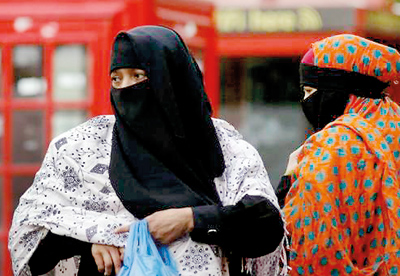Sunday Times 2
Amidst calls for ban, veil stirs debate in Britain
View(s):LONDON (AFP) – Britain has been dragged into a debate on Muslim women wearing full-face veils in public, with its biggest selling newspaper backing calls from politicians to join European countries that have banned its use. The topic had stayed below the British political radar until the past week when a judge ruled that a Muslim woman will be allowed to go on wearing a veil but must take it off while giving evidence at her trial.

Women wearing a full-face veil as they shop in London (Reuters)
Her case came after Birmingham Metropolitan College, in a central English city which has a large Muslim population, dropped a ban on Muslim face veils after thousands of people signed a petition against the rule. Junior Home Office Minister Jeremy Browne called on Monday for a “national debate” on the issue.
It exploded onto the front pages Tuesday after The Sun, Rupert Murdoch’s top-selling British tabloid, carried a huge splash with the headline “UNVEILED” over a picture of the woman defendant wearing a niqab. The Sun — which sells 2.25 million copies a day and features a photo of a topless woman in its daily “Page 3″ feature — demanded “vital reforms” that would ban veils in schools, courts, hospitals, airports, banks and secure areas.
But it said women should have “freedom to wear them in streets and parks.”Many other newspapers took a similar stance.
In the right-leaning Daily Mail, former interior minister Jack Straw wrote that the government should “go further”, while the Daily Telegraph said in an editorial that “veils in court are a barrier to justice.”The Daily Express meanwhile said that “Britain needs to turn back the spread of the veil.”The left-leaning Guardian disagreed, saying that “full-face veils aren’t barbaric — but our response can be.”‘The elephant in the courtroom’
There is no ban on wearing the full-face veil in Britain, and a number of Muslim women do so, particularly in cities with large ethnic communities such as London, Birmingham and Bradford. The debate is one that Britain, which prides itself on a liberal heritage and ethnic tolerance, has largely avoided even as some of its European neighbours with large Muslim populations have acted.
France has banned women from wearing full-face veils in public since April 2011 and Belgium followed suit three months later. Other nations are considering similar legislation, including Switzerland, Italy and the Netherlands. The leading Muslim Council of Britain has expressed “concern at the direction of the national conversation currently taking place on the niqab”.
“There are few people who wear the niqab, and they should be allowed to wear this veil if they freely decide to do so,” said Talat Ahmed, chairwoman of the council’s committee for social and family affairs. The veil debate “usually comes with a diet of bigoted commentary”, she added.
A growing number of politicians in Britain have been calling for a ban. Prime Minister David Cameron, from the centre-right Conservative party, had backed Birmingham Metropolitan College’s stance on wearing the veil. Then Browne, from the centrist Liberal Democrats who are in coalition with the Conservatives, weighed in on Sunday when he said that Muslim girls and young women should be banned from wearing veils in schools and public places.
Browne told the Telegraph newspaper he was “instinctively uneasy” about restricting individual choice but added: “I think this is a good topic for national debate.”His views echoed those of some Conservatives in parliament who have been pushing for a ban.
But Deputy Prime Minister Nick Clegg, the leader of the Liberal Democrats, said he opposed any legal ban. ”My own view, very strongly held, is that we shouldn’t end up like other countries issuing edicts or laws from parliament telling people what they should or should not wear,” Clegg said. But the government may find it needs to address the issue sooner than it thinks.
Judge Peter Murphy — who in the veil case on Monday ordered the 22-year-old woman from London to go uncovered to give evidence in her trial on a charge of intimidation — said there needed to be clarity on the legal situation.
He expressed the “hope that parliament or a higher court will provide a definite answer” to the issue soon, adding: “The niqab has become the elephant in the courtroom.”
comments powered by Disqus
